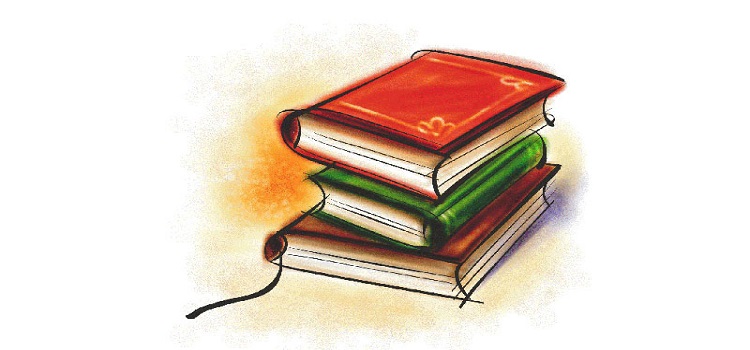What follows are two literature sections. The first is a number of books with secular versions – and interpretations – of the 12 Steps. The second is everything else: a variety of books about the history of AA, stories, guides, etc.

The Little Book:
A Collection of Alternative 12 Steps – Second Edition
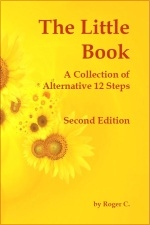 The book contains (1) Twenty alternative (and mostly secular) versions of the 12 Steps (2) Four secular interpretations of each of the Steps by well-known authors Stephanie Covington, Thérèse Jacobs-Stewart, Allen Berger and Gabor Maté (3) Templates so the reader can write her or his own personal interpretations of each of the Steps and (4) An essay that insightfully traces the origins of the AA 12-Step recovery program.
The book contains (1) Twenty alternative (and mostly secular) versions of the 12 Steps (2) Four secular interpretations of each of the Steps by well-known authors Stephanie Covington, Thérèse Jacobs-Stewart, Allen Berger and Gabor Maté (3) Templates so the reader can write her or his own personal interpretations of each of the Steps and (4) An essay that insightfully traces the origins of the AA 12-Step recovery program.
“A beautiful testimony to AA’s living history.” Ernest Kurtz, author, Not-God: A History of Alcoholics Anonymous.
Le petit livre jaune:
Les douze étapes vuent autrement
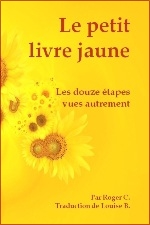 Contenue du livre:
Contenue du livre:
(1) Vingt versions des douze étapes (2) Les interprétations de chacune des étapes par quatre experts renommés : Stephanie Covington, Thérèse Jacobs-Stewart, Allen Berger et Gabor Maté (3) Des gabarits pour écrire une version personnelle et des interprétations de chacune des étapes et (4) Un essai qui trace l’histoire des douze étapes et qui pose un regard critique sur cette histoire.
« Un merveilleux témoignage de l’histoire en évolution des AA. » Ernest Kurtz, auteur de Not God: A History of Alcoholics Anonymous.
The Alternative 12 Steps:
A Secular Guide to Recovery
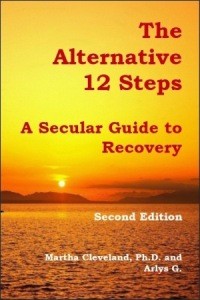 “We can learn the universal, generic pattern of life’s dance from the 12 Steps. But in our individual dance of life, we choose our own music and dance our own dance.” (Chapter Three)
“We can learn the universal, generic pattern of life’s dance from the 12 Steps. But in our individual dance of life, we choose our own music and dance our own dance.” (Chapter Three)
The authors, Martha Cleveland and Arlys G., show how the 12-Step program can be interpreted and worked by those who do not believe in an interventionist deity. At the same time they conscientiously maintain the intention and integrity of the program – its values, scope and depth. A chapter is devoted to each Step. This is a unique, inspiring and helpful book for anyone – regardless of belief or lack of belief – who would like to work the 12 Step program.
Staying Sober Without God:
The Practical 12 Steps to Long Term Recovery
 Staying Sober Without God is an approach to the 12 steps that empowers the individual, reframes spiritual changes as real-world psychological events, and adds a few concrete actions that can aid in the lifestyle and personality changes needed to bring about lasting recovery.
Staying Sober Without God is an approach to the 12 steps that empowers the individual, reframes spiritual changes as real-world psychological events, and adds a few concrete actions that can aid in the lifestyle and personality changes needed to bring about lasting recovery.
They are devoid of anything outside the realm of the natural world. Rather than requiring the help of the supposed creator of the universe, we are building confidence in our own ability to rewire our brains, establish new behavior patterns, and make the choice to live a better life. (p. 24)
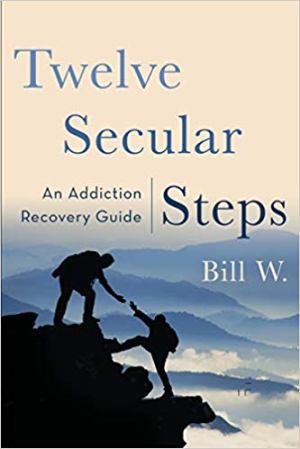 An updated and contemporary version of the 12 Step program of recovery has been published. Imagine!
An updated and contemporary version of the 12 Step program of recovery has been published. Imagine!
And it’s super good! The author, a university professor of biology, explains the “what”, “why” and “how” of alcoholism / addiction and shares the purpose and usefulness of the 12 Step program – its values, scope and depth in an eminently readable and helpful fashion.
All without the God bit…
The Five Keys:
12 Step Recovery Without A God
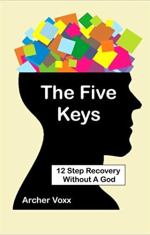 A five-star review by John S, the creator of the website, AA Beyond Belief, posted on Amazon:
A five-star review by John S, the creator of the website, AA Beyond Belief, posted on Amazon:
“I highly recommend this book to anyone who is interested in 12 Step Recovery. If you are just starting out on your journey into recovery and are put off by the “God stuff” in the 12 Steps, this book will help put all of that in perspective.
Archer does a brilliant job explaining how the steps can be worked from a purely secular perspective. We use this book at my home group and it makes for interesting discussion and I think it’s particularly helpful to the newcomer.”
The Proactive Twelve Steps
A Mindful Program for Active Change
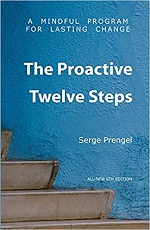 “Wonderful alternative to the traditional 12 steps without the religious focus.”
“Wonderful alternative to the traditional 12 steps without the religious focus.”
Amazon
“Serge Prengel reframes the 12-step model into an efficient manual for self-initiated change. The model brilliantly and succinctly provides a map to disentangle the individual from the pervasive constraints that have resulted in self-destructive behaviors, which have limited opportunities to enjoy life and to experience feelings of purpose and satisfaction.”
Steven Porges

Daily Reflections for Modern Twelve Step Recovery
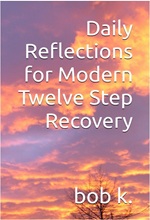
There are very positive reviews of this book on Amazon! Here are a few of them:
Thoroughly Modern Bob!
I love this book! I love how it reflects the past while accommodating the present and foreseeable future in recovery programs. The past got us to the present and informs our presence, both now and in coming times. Bob comments on this beautifully, and I enjoy this work of his. Thank you for writing this, Bob!
The Addiction Recovery Handbook
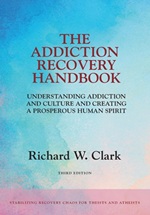
The Addiction Recovery Handbook – Understanding Addiction and Culture and Creating a Prosperous Human Spirit.
This is an interesting and readable book and is intended for everyone: addicts, medical professionals, counsellors, therapists, clients, sponsors, social workers, family members, partners, friends, employers — every stakeholder in a healthy, non-judgmental society that cares about the wellbeing of all its members.
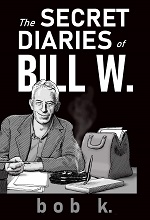
“It is hard to remember, reading this, that it is really fiction. Bill’s personality comes through so strongly it is easy to forget. And although it is fiction, it is based on real, expertly researched, history…”
“It is a whole history of his life, and of AA as he was so much a part of it. The joy of this is a first-person story, not some dry history. From the infamous boomerang, through early girl friends, the army, learning to drink… the wall street days… to meeting Dr. Bob and starting AA… all the way to much later debates about the Catholic Church, using LSD, and other women, this is Bill’s own (fictional) thoughts. A huge scope. I could not put it down.” (A review by Chris G.)
Beyond Belief:
Agnostic Musings for 12 Step Life
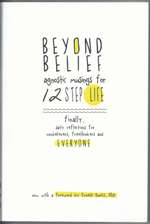 “A book of daily readings that really hit problems we face, with sound insights, and new ideas. All without referring us to God for a solution. I read it daily, and even with years in 12 step programs, find new ideas and things to ponder often. Very refreshing!” (A review by Annalia on Amazon)
“A book of daily readings that really hit problems we face, with sound insights, and new ideas. All without referring us to God for a solution. I read it daily, and even with years in 12 step programs, find new ideas and things to ponder often. Very refreshing!” (A review by Annalia on Amazon)
A daily reflection book for everyone, Beyond Belief offers 365 quips for every alcoholic/addict and draws on quotes from writers, skeptics, entertainers, economists, religious leaders, philosophers, psychologists and, well, everyone! A wonderful read!
Key Players in AA History
Second Edition
 A very well researched and written history of the founders and early members of the world wide Fellowship of Alcoholics Anonymous. The essays contained in this book are very informative and engaging, bringing the history alive! It also clarifies many myths and half truths which are sometimes heard in and about Alcoholics Anonymous. The author’s captivating writing style, mixed with a sense of humor and great knowledge of the subject, makes this book one of a kind.
A very well researched and written history of the founders and early members of the world wide Fellowship of Alcoholics Anonymous. The essays contained in this book are very informative and engaging, bringing the history alive! It also clarifies many myths and half truths which are sometimes heard in and about Alcoholics Anonymous. The author’s captivating writing style, mixed with a sense of humor and great knowledge of the subject, makes this book one of a kind.
A wonderful book, written in a lively and entertaining style and full of fascinating detail. A great read!
Do Tell!
Stories by Atheists & Agnostics in AA
![Do Tell! [Front Cover]](https://aaagnostica.org/wp-content/uploads/2015/05/Do-Tell-Full-Blue-Front-Cover-200-FRAMED-200x300.jpg) These are personal and honest stories. All unique, all different. Moreover the style and tone of each author is different.
These are personal and honest stories. All unique, all different. Moreover the style and tone of each author is different.
So refreshing, inspiring!
The stories in the book alternate between those by women and those by men and so we discover early on – if we did not appreciate this already – that the factors involved in addiction and recovery are often quite different in the lives of men and women.
You can’t be a real ALCOHOLIC
if you Don’t believe in GOD
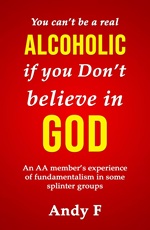
Andy has written a book which he called “You can’t be a real alcoholic if you don’t believe in God.” Please click the link below to obtain a copy of the E-Book on Amazon. Andy wanted to make it available for free but Amazon has set a minimum price of 99 cents. Here’s the link: https://www.amazon.com/dp/B0CQ2V11SC.
Alternatively, you can download a free copy in PDF format here. This short book will increase awareness, especially among newcomers, of the risks of getting involved with any fundamentalism, religious or otherwise, in twelve-step recovery.
Here’s the link for the free copy:
Click to access you-cant-be.pdf
Don’t Tell:
Stories and Essays by Agnostics and Atheists in AA
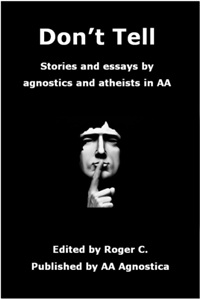 This captivating book provides a wide view of the world of agnostic / atheist AA. There is a huge scope to the book: a set of “experience, strength and hope” stories, different interpretations of the 12 steps, book reviews, early and current history, and a dynamite section on the Lord’s Prayer. The final section, Moving Forward, is all about agnostic AA being alive and well and coming to a meeting near you.
This captivating book provides a wide view of the world of agnostic / atheist AA. There is a huge scope to the book: a set of “experience, strength and hope” stories, different interpretations of the 12 steps, book reviews, early and current history, and a dynamite section on the Lord’s Prayer. The final section, Moving Forward, is all about agnostic AA being alive and well and coming to a meeting near you.
As Ernie Kurtz (Not-God) and Bill White (Slaying the Dragon) write in the Foreword: “Broadening, welcome change… is of the essence of AA.” And that’s the essence of this book.
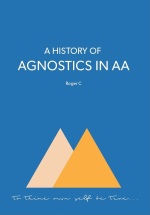 What could our Fellowship do to be more accommodating of we alcoholics who attribute our sobriety to an inner resource (Appendix II of the Big Book) rather than to a Higher Power, whom many in AA choose to call “God”?
What could our Fellowship do to be more accommodating of we alcoholics who attribute our sobriety to an inner resource (Appendix II of the Big Book) rather than to a Higher Power, whom many in AA choose to call “God”?
This book is divided into three main parts: Our History, Problems in AA and Moving Forward.
Our hope is that Alcoholics Anonymous adapts and moves forward, with greater inclusiveness. A History of Agnostics in AA is meant to contribute to that goal.
12 Smart Things
to Do When the Booze and the Drugs are Gone
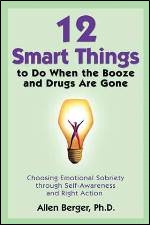 This book is all about its subtitle: Choosing Emotional Sobriety through Self-Awareness and Right Action.
This book is all about its subtitle: Choosing Emotional Sobriety through Self-Awareness and Right Action.
As Archer Voxx puts it in his review of the book: “…exploring the subject of emotional sobriety and incorporating its principles into your recovery toolkit is a wonderful way to enhance your recovery experience.”
Just one of several excellent books written by Allen Berger, a popular public speaker and nationally recognized expert on the science of recovery.
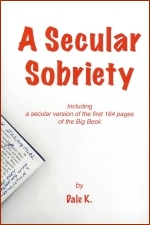 In the first three chapters of A Secular Sobriety – Including a Secular Version of the First 164 Pages of the Big Book Dale describes how he stayed sober in AA in Florida over the last 36 years in spite of “rampant Christian religiosity” in most meetings. In the subsequent dozen chapters he goes on to rewrite the first 164 of the Big Book, with “pertinent commentaries” for his revisions.
In the first three chapters of A Secular Sobriety – Including a Secular Version of the First 164 Pages of the Big Book Dale describes how he stayed sober in AA in Florida over the last 36 years in spite of “rampant Christian religiosity” in most meetings. In the subsequent dozen chapters he goes on to rewrite the first 164 of the Big Book, with “pertinent commentaries” for his revisions.
Pointing out that the stories at the end of the Big Book show a “decided bias” towards Christian belief, Dale ends his book with three new and original stories of recovery, all by women who attend secular AA meetings. A superb book!
Waiting:
A Nonbeliever’s Higher Power
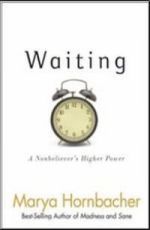 In Waiting, best-selling author Marya Hornbacher uses the story of her own journey, beginning with her recovery from alcoholism, to offer a fresh approach to cultivating a spiritual life. Relinquishing the concept of a universal “Spirit” that exists outside of us, Hornbacher gives us the framework to explore the human spirit in each of us – the very thing that sends us searching, that connects us with one another, the “thing that comes knocking at the door of our closed lives”. The wisdom and compassion contained in the pages of Waiting: A Nonbeliever’s Higher Power cannot help but guide the reader toward a renewed and deeper understanding of a spiritual life which she emphasizes exists right here, right now, in this world.
In Waiting, best-selling author Marya Hornbacher uses the story of her own journey, beginning with her recovery from alcoholism, to offer a fresh approach to cultivating a spiritual life. Relinquishing the concept of a universal “Spirit” that exists outside of us, Hornbacher gives us the framework to explore the human spirit in each of us – the very thing that sends us searching, that connects us with one another, the “thing that comes knocking at the door of our closed lives”. The wisdom and compassion contained in the pages of Waiting: A Nonbeliever’s Higher Power cannot help but guide the reader toward a renewed and deeper understanding of a spiritual life which she emphasizes exists right here, right now, in this world.

We are all aware of Conference Approved books sold by the General Service Office (GSO), such as the Big Book, Twelve Steps and Twelve Traditions and Living Sober. Here’s what the GSO says about literature from other publishers:
(The term Conference Approved) does not imply Conference disapproval of other material about AA. A great deal of literature helpful to alcoholics is published by others, and AA does not try to tell any individual member what he or she may or may not read. (Service Material from the General Service Office)
Nonetheless, the term “conference approved” is quite unfortunate and must be changed.
A manager of the AA General Service Office, Bob Pearson, said this, 35 years ago: “The greatest danger facing AA today (is)… prohibiting non-Conference approved literature, i.e., ‘banning books’.” AA’s Greatest Danger – Rigidity.
In the last three and half decades, nothing has changed. The only books available at the GSO, Intergroups, Central Offices and at the literature tables at traditional AA meetings are “conference approved”. Everything else is indeed banned.
And why is that? Because only literature that is published and sold by the GSO is “conference approved”. That’s where they get their profits. In fact, in 2019 the GSO made $9,358,751 from literature sales.
Thus “conference approved”. And the “banning” of everything else, no matter how helpful it might be for those in recovery.
Shame on the GSO.

